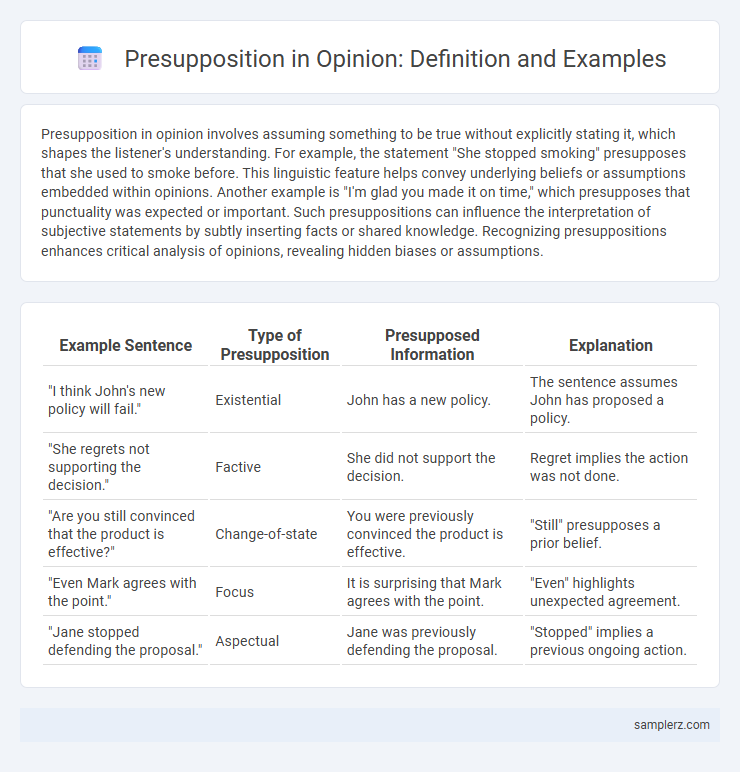Presupposition in opinion involves assuming something to be true without explicitly stating it, which shapes the listener's understanding. For example, the statement "She stopped smoking" presupposes that she used to smoke before. This linguistic feature helps convey underlying beliefs or assumptions embedded within opinions. Another example is "I'm glad you made it on time," which presupposes that punctuality was expected or important. Such presuppositions can influence the interpretation of subjective statements by subtly inserting facts or shared knowledge. Recognizing presuppositions enhances critical analysis of opinions, revealing hidden biases or assumptions.
Table of Comparison
| Example Sentence | Type of Presupposition | Presupposed Information | Explanation |
|---|---|---|---|
| "I think John's new policy will fail." | Existential | John has a new policy. | The sentence assumes John has proposed a policy. |
| "She regrets not supporting the decision." | Factive | She did not support the decision. | Regret implies the action was not done. |
| "Are you still convinced that the product is effective?" | Change-of-state | You were previously convinced the product is effective. | "Still" presupposes a prior belief. |
| "Even Mark agrees with the point." | Focus | It is surprising that Mark agrees with the point. | "Even" highlights unexpected agreement. |
| "Jane stopped defending the proposal." | Aspectual | Jane was previously defending the proposal. | "Stopped" implies a previous ongoing action. |
Common Presuppositions in Everyday Opinions
Common presuppositions in everyday opinions often include assumptions about shared values or experiences, such as believing that honesty is universally important or that everyone wants to improve their quality of life. These implicit beliefs shape how opinions are framed and understood without being explicitly stated. Recognizing these presuppositions can reveal underlying biases and enhance critical evaluation of subjective statements.
How Presupposition Shapes Opinion Statements
Presupposition shapes opinion statements by embedding assumptions that guide the listener's interpretation, such as in "Even experts agree this policy will fail," which presupposes widespread expert consensus. These underlying assumptions influence how opinions are received, making them appear more credible or biased depending on the presupposed information. Recognizing presuppositions reveals the implicit commitments behind opinion statements, uncovering how language frames and directs public discourse.
Subtle Presuppositions in Popular Opinion Pieces
Subtle presuppositions in popular opinion pieces often shape readers' perceptions by embedding assumptions within statements, such as "Given the widespread failure of current policies," which presupposes existing policies are ineffective. These implicit premises guide interpretation without overt assertion, influencing public discourse and framing debates on complex social issues. Recognizing these underlying assumptions enhances critical reading skills and promotes a more nuanced understanding of opinion narratives.
Examples of Presupposition Influencing Public Opinion
Presuppositions embedded in political speeches, such as assuming economic growth is declining, can shape public perception by framing issues as urgent problems requiring immediate action. Media headlines that presuppose a candidate's guilt before trial influence public opinion by creating bias toward negative judgments. Advertising campaigns often use presupposition by implying product superiority, which persuades consumers to favor certain brands without explicit comparison.
Opinion vs. Fact: Unveiling Implicit Presuppositions
Opinions often embed presuppositions that blur the line between subjective views and objective facts, revealing implicit assumptions within statements. For instance, the opinion "She is a great leader" presupposes that leadership qualities can be universally agreed upon and measurable. Understanding the distinction between opinion and fact requires critically examining these hidden presuppositions embedded in language.
The Role of Presupposition in Persuasive Opinions
Presupposition plays a crucial role in shaping persuasive opinions by embedding assumptions that guide the audience's interpretation of the message. For instance, stating "When people recognize climate change as a crisis, they will support urgent policies" presupposes that climate change is already acknowledged as a crisis by the audience. This subtle linguistic strategy influences belief systems and frames arguments in a way that aligns with the speaker's viewpoint without overtly stating contentious premises.
Recognizing Hidden Presuppositions in Opinions
Recognizing hidden presuppositions in opinions requires identifying assumptions that are implicitly accepted as true, such as the belief that a particular policy is effective before discussing its merits. For example, when someone states, "We need to improve education funding," the presupposition is that current funding levels are inadequate. This critical awareness helps to evaluate opinions more objectively by revealing underlying biases or unexamined premises.
Language Techniques: Presupposition in Opinion Writing
Presupposition in opinion writing subtly influences readers by assuming certain information as true, shaping their perception without direct assertion. This technique often embeds familiar facts or widely accepted beliefs, guiding the audience to accept the opinion as reasonable or self-evident. Effective use of presupposition leverages shared knowledge, enhancing persuasive impact and reinforcing the writer's viewpoint.
Analyzing Opinionated Texts for Presupposition Clues
Opinionated texts often contain presuppositions that reveal underlying assumptions, such as taking certain facts for granted without explicit evidence. Identifying these presupposition clues, like implicit beliefs or presupposed knowledge, helps analyze bias and the author's perspective more accurately. Careful examination of language structures, including choice of words and omitted alternatives, uncovers hidden presuppositions shaping the opinion.
Presupposition Traps in Forming Personal Opinions
Presupposition traps in forming personal opinions occur when assumptions within a statement subtly influence beliefs without conscious awareness, such as the question "Why do you support that policy?" presuming support exists. These traps can reinforce biases by embedding unexamined premises, leading to opinions based on incomplete or skewed information. Recognizing and questioning the underlying presuppositions helps ensure opinions are genuinely reflective rather than manipulated.

example of presupposition in opinion Infographic
 samplerz.com
samplerz.com